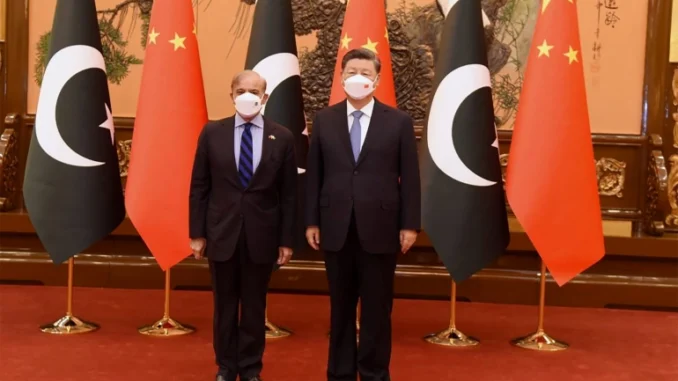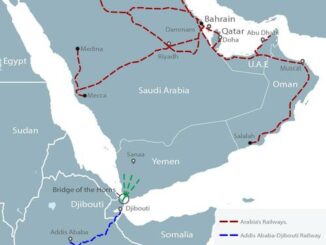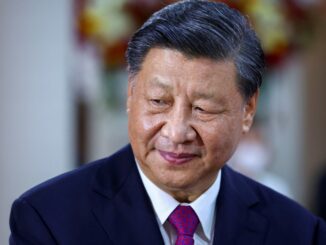
Islamabad, Pakistan – President Xi Jinping has said China will continue to support Pakistan to help it stabilise its economy, as he hosted Pakistani Prime Minister Shehbaz Sharif for talks.
The leaders met at Beijing’s Great Hall of the People on Wednesday, the last day of Sharif’s two-day visit to China, his first since taking office in April.
Xi said the two neighbours should boost collaboration in the development of the China-Pakistan Economic Corridor (CPEC), a $60bn infrastructure project, as well as speed up work on building the Gwadar seaport in Pakistan’s Balochistan province, according to Chinese state media.
For his part, Sharif thanked Xi for China’s “invaluable assistance to Pakistan’s relief and rehabilitation work” in the aftermath of recent floods, which killed more than 1,700 people and affected some 33 million.
A statement released by his office said the leaders spoke about various projects of “strategic importance”, including work on the CPEC and the construction of a railway line.
Sharif said Pakistan drew inspiration from China’s socioeconomic development and national resolve for progress and prosperity, the statement added, noting that the prime minister had extended an invitation to Xi for a visit to Pakistan, which was accepted.
Later on Wednesday, Sharif also met his Chinese counterpart, Li Keqiang.
The relationship of historical allies Pakistan and China has only grown stronger during the past decade, a period in which Islamabad’s ties with Washington gradually cooled.
Balanced approach
Muhammad Faisal, an Islamabad-based foreign policy analyst and a close observer of Pakistan-China ties, said Sharif’s visit was an important marker for Pakistan as it seeks to maintain a balanced approach in the face of the escalating strategic competition between China and the United States, which has direct implications for the regional order in South Asia.
He said he expected issues related to Afghanistan and India, which has emerged as Pakistan and China’s biggest regional rival, to have topped the agenda in the leaders’ talks.
“Both Islamabad and Beijing have different concerns with these neighbours,” Faisal told Al Jazeera. “However, both are compelled to pursue cooperation to inject stability in the regional environment.”
Andrew Small, the author of The China-Pakistan Axis, says that Islamabad needed to tread carefully while maintaining stable relations with both Beijing and Washington.
“It is trying to reconcile the deepening of ties with China with the opportunity to reset relations with the US after the withdrawal from Afghanistan, all in the context of intensifying Sino-US rivalry. Normally US-Pakistan and China-Pakistan relations have been able to coexist happily – now there are pressures from both sides,” he told Al Jazeera.
Pakistan’s dependence on China for its financial and defence needs has increased over the years – but this has come at a cost.
Pakistan owes nearly $30bn – or 23 percent of its total external debt – to China.
US Secretary of State Antony Blinken raised the issue during a meeting with Pakistani foreign minister Bilawal Bhutto in September, urging Islamabad to discuss debt relief and payment restructuring with Beijing.
“The visit is taking place at a time when Pakistan is facing serious economic challenges, multiplied by the recent flooding in the country. If Pakistan manages to achieve guarantees of rescheduling of debt and rolling over of deposits, it could be a landmark achievement of this visit,” Fazal ur Rahman, director of the Pakistan Institute of China Studies at the University of Sargodha, told Al Jazeera.
Small also said the issue of debt would be closely watched in the US.
“The real question in Washington [is] about whether Pakistan will fix some of its debt issues directly with China, or expect other actors to do the heavy lifting,” he added.
Security incidents
China’s growing presence in Pakistan has coincided with an increase in the number of attacks against Chinese nationals and installations, especially in the country’s restive southern region.
Many of the Chinese infrastructure projects are situated in the resource-rich province of Balochistan, which is also Pakistan’s most impoverished region and home to a long-running armed campaign by fighters.
Three Chinese citizens were killed in a suicide attack in Karachi in April. Pakistan’s largest city saw another attack in September in which three more Chinese-Pakistani citizens, who worked as dentists and had lived in the country for decades, were killed.
Rahman said a stable and secure Pakistan was in China’s strategic and regional interests.
“However, one should keep in mind that Pakistan will be going for elections, so the Chinese may not agree to any long-term commitments with the incumbent regime,” he added.
Small noted that China was “uncertain about the political landscape in Pakistan – and there’s not much the visit can do on that front.
“The Chinese government likes Shehbaz Sharif and this government generally, but they will be waiting to see whether things settle before making any really major new commitments.”


